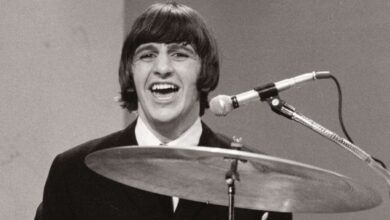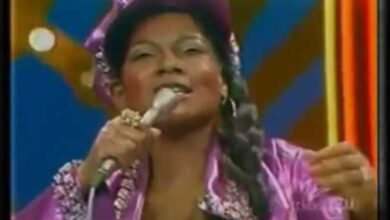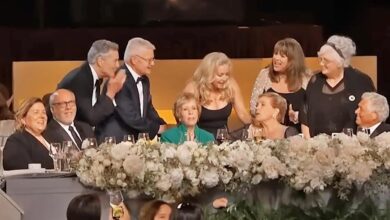“If I Can Dream” is a powerful ballad by Elvis Presley, characterized by its profound lyrics and sweeping orchestral arrangement. This song, which Elvis performed in his 1968 “Comeback Special,” marked a significant moment in his career, revitalizing his image and reconnecting him with a broad audience. The performance showcased Elvis in a striking black leather outfit, symbolizing his return to his musical roots and reestablishing him as a dominant force in the rock and roll scene.
The song itself was written by Walter Earl Brown and includes quotes from Martin Luther King Jr. It was penned during a turbulent period in American history, reflecting the social and political unrest of the 1960s. The lyrics speak to a vision of hope and unity, resonating deeply during a time of significant societal strife. Elvis’s rendition of “If I Can Dream” is delivered with an emotional intensity that underscores his deep connection to the song’s themes of peace and brotherhood.
Orchestrally, “If I Can Dream” is rich and expansive. The 1968 performance was backed by a full orchestra, adding a dramatic layer that complemented Elvis’s powerful vocals. The orchestration helped to elevate the song’s impact, creating a stirring and inspirational anthem. The arrangement included lush strings, brass, and woodwinds, orchestrated to build a crescendo that mirrors the song’s message of hope and renewal.
Elvis’s performance in the ’68 Comeback Special, particularly with “If I Can Dream,” is often regarded as one of his most memorable and impactful. This show not only marked his return to live performances but also reinvigorated his career at a time when many believed his reign as the King of Rock and Roll was nearing its end. The special aired on NBC and was viewed by a massive audience, reaffirming his status as a cultural icon.
The significance of “If I Can Dream” extends beyond its immediate impact. It has been covered and referenced by numerous artists over the years, highlighting its enduring appeal and the timeless quality of its message. The song encapsulates a period of American history while also standing as a testament to Elvis’s artistry and his ability to capture the zeitgeist through music.
Elvis Aaron Presley, born in 1935 in Tupelo, Mississippi, rose to unprecedented fame in the mid-1950s with hits like “Heartbreak Hotel,” “Hound Dog,” and “Jailhouse Rock.” His music, a blend of rock, country, blues, and gospel influences, played a pivotal role in the birth of rock and roll and made him an icon of American culture. His charismatic stage presence and distinctive vocal style broke social and racial barriers in music at a time when the country was deeply segregated.
Throughout his career, Elvis received numerous accolades and was known for his generosity and humanitarian efforts. Despite facing personal struggles, including a highly publicized battle with prescription drug addiction, he remained a beloved figure until his untimely death in 1977. Today, Elvis continues to be celebrated as one of the most influential and iconic figures in music and popular culture, with a legacy that endures through his vast catalog of recordings and enduring fan base.
The orchestral version of “If I Can Dream” from the ’68 Comeback Special continues to be celebrated for its emotional depth and musical sophistication, demonstrating Elvis’s versatility as an artist and his ability to resonate with audiences across different eras and musical tastes.
Elvis Presley, known as the King of Rock and Roll, remains an enduring figure in American culture, not just for his musical prowess but also for his fascinating personal life, particularly his relationship with Priscilla Presley. Their love story, filled with glamour, controversy, and deep personal connection, offers a compelling glimpse into the private world of one of the 20th century’s most iconic figures.
The Beginning of a Fairytale
Elvis met Priscilla Beaulieu in 1959 during his stint in the Army in West Germany. Priscilla was just 14 years old at the time, while Elvis was 24. The age gap was significant, but for Elvis and Priscilla, it was the start of a complex and intense relationship. Elvis, already a global star, was immediately struck by Priscilla’s beauty and poise, while she was enamored by his charm and fame. Despite the concerns about their age difference, the relationship blossomed, with Priscilla visiting Elvis at his home in Graceland for extended periods.
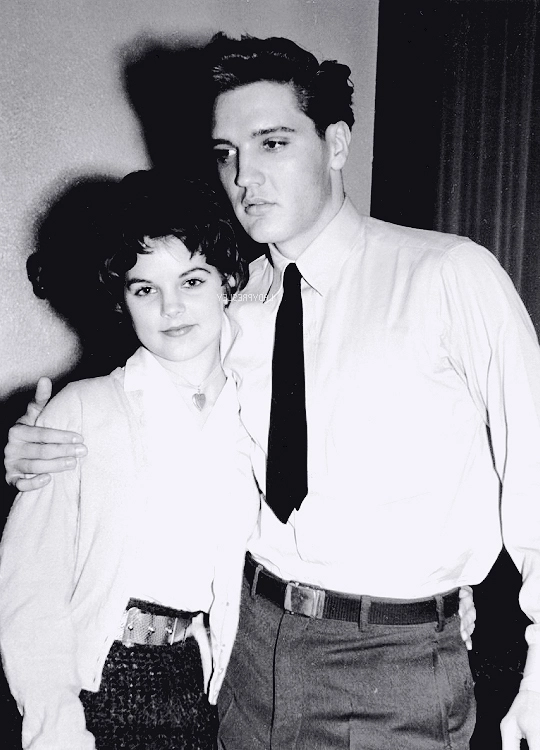
Life at Graceland
Living with Elvis at Graceland was like being in a world apart from the rest of society. Priscilla described those years as both exciting and challenging. Elvis’s lifestyle was anything but ordinary, filled with late-night parties, a constant stream of celebrities, and the pressures of maintaining his public image. Priscilla had to adapt to this high-paced life, often finding herself trying to meet Elvis’s exacting standards of beauty and behavior.
The Wedding
Elvis and Priscilla’s wedding, on May 1, 1967, at the Aladdin Hotel in Las Vegas, was a major media event. It was orchestrated with the precision of a Hollywood production, primarily due to Elvis’s manager, Colonel Tom Parker, who saw the marriage as another opportunity to promote Elvis’s image. The wedding was lavish yet brief, and the reception was filled with Hollywood celebrities and members of the press. However, despite the public spectacle, their marriage was fraught with personal challenges right from the start.
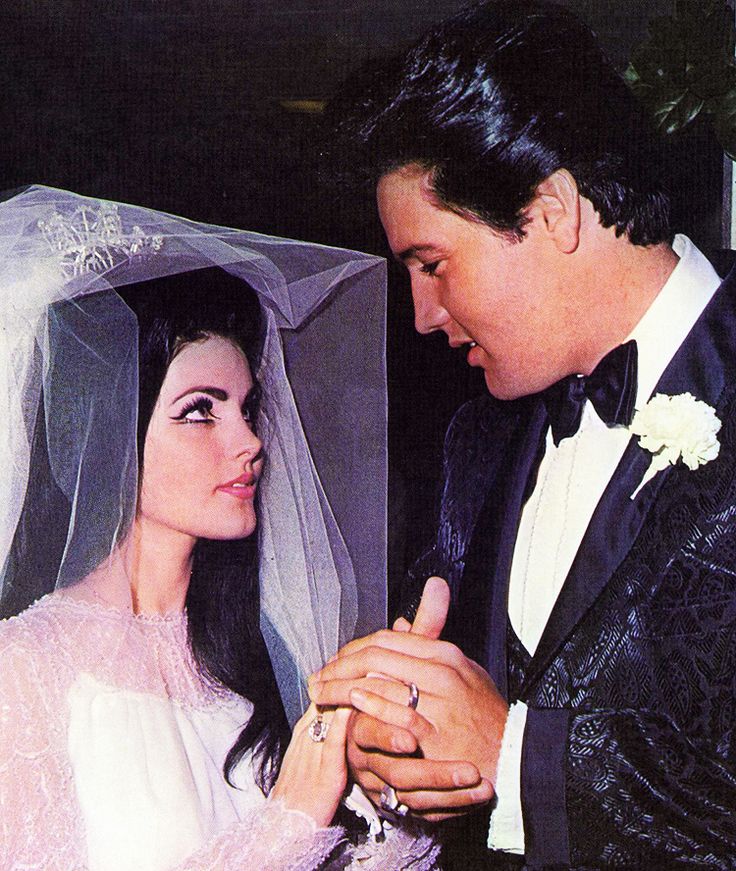
Life After Marriage
The early years of their marriage seemed idyllic from the outside but were quite different in reality. Elvis and Priscilla faced numerous challenges, including Elvis’s frequent absences due to his film and music career and his growing dependence on prescription drugs. Priscilla, on her part, struggled with her identity, living in the shadow of such a colossal figure and trying to carve out her own space in the chaotic world that was Elvis’s life.
Lisa Marie Presley
The birth of their daughter, Lisa Marie, on February 1, 1968, brought joy and a new sense of purpose to their marriage. However, the demands of their lives did not pause; if anything, they intensified. Elvis’s career was undergoing a transformation with his 1968 comeback special, and Priscilla was adjusting to motherhood under the intense scrutiny of the public eye.
The Strain and Separation
As the years passed, the strain on their marriage grew. Elvis’s health was declining due to his addiction issues, and his behavior became increasingly erratic. Priscilla, seeking autonomy and fulfillment, pursued her interests and eventually opened her own boutique. The couple’s diverging paths led to a separation in 1972, and they divorced amicably in 1973.
Life After Elvis
Post-divorce, Priscilla emerged as a savvy businesswoman, turning Graceland into a major tourist attraction and thereby securing the financial legacy of Elvis for their daughter. She also developed her acting career, most notably appearing in the “Naked Gun” films and the TV series “Dallas.”
A Complex Legacy
The relationship between Elvis and Priscilla Presley remains a subject of fascination. It was a mixture of true love, mutual admiration, and the pressures of living in the spotlight. Their story reflects the complexities of balancing personal desires against public expectations, a theme as relevant today as it was during the height of Elvis’s fame.
Their legacy, intertwined through their shared experiences and their daughter, continues to influence discussions about celebrity culture, personal sacrifice, and the elusive nature of happiness within the glittering confines of fame.
